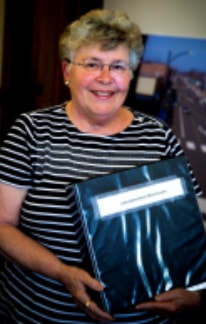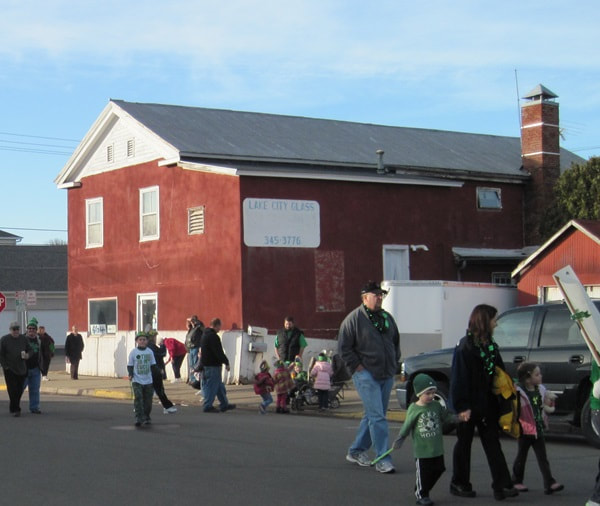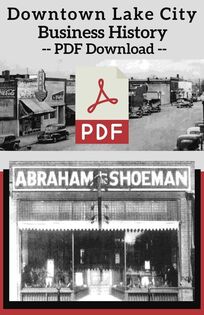Sharon Nelson's Early Business HIstory

In 2004, when she retired from Jostens (Diploma Division) in Red Wing after 30 years, Sharon Nelson looked around for a hobby. Never having been to the Goodhue County Historical Society in all the years she had lived in Red Wing, since 1949, she decided to pay the museum a visit. After looking through albums of Red Wing’s early buildings and businesses, Sharon was fascinated and adopted this particular facet of local history as her hobby.
During the next four years she read through many of the early newspapers, researching businesses and copying ads. She organized an album, store by store, identifying who ran the store and when. Besides the early businesses, she kept notes on the fires that destroyed and damaged businesses, the shooting of two Red Wing police officers, and other news items she believed today’s readers would find of interest.
Her book Early Red Wing Businesses—Street by Street was published in 2015. Two other books she compiled were published earlier, Red Wing’s Early Neighborhood Groceries & Meat Markets and Frontenac Station, The Early Years. Sharon observed that what she had done in Red Wing might be done in Lake City to capture and organize the community’s early business history.
Beginning the fall of 2015, Sharon made two trips a week to the Lake City library to sort through microfilm records of newspapers going back as far as 1861. “I was particularly interested in the livery stables, wagon and carriage shops, and also the harness shops,” she said of the pre-automobile, pioneering era when farms were being carved out of the frontier at a rapid pace. Although peripheral to her focus on the business scene, she made notable events part of her preservation work as well, the great fire of 1882, for example, and the killing of a Lake City police officer in 1892.
During the next four years she read through many of the early newspapers, researching businesses and copying ads. She organized an album, store by store, identifying who ran the store and when. Besides the early businesses, she kept notes on the fires that destroyed and damaged businesses, the shooting of two Red Wing police officers, and other news items she believed today’s readers would find of interest.
Her book Early Red Wing Businesses—Street by Street was published in 2015. Two other books she compiled were published earlier, Red Wing’s Early Neighborhood Groceries & Meat Markets and Frontenac Station, The Early Years. Sharon observed that what she had done in Red Wing might be done in Lake City to capture and organize the community’s early business history.
Beginning the fall of 2015, Sharon made two trips a week to the Lake City library to sort through microfilm records of newspapers going back as far as 1861. “I was particularly interested in the livery stables, wagon and carriage shops, and also the harness shops,” she said of the pre-automobile, pioneering era when farms were being carved out of the frontier at a rapid pace. Although peripheral to her focus on the business scene, she made notable events part of her preservation work as well, the great fire of 1882, for example, and the killing of a Lake City police officer in 1892.
Stories uncovered

“It was fascinating how businesses changed hands constantly and how buildings were moved from place to place so easily,” she commented. “Thirteen buildings were purchased from Wacouta and transported to become Lake City business locations.” Lake City Glass, a business at the corner of Washington and Chestnut, is but one example as she explains in a caption under a photo taken in 1938. “This is one of two buildings … moved to Lake City from Wacouta, Minnesota, in 1864. This building was built in 1857 by George W. Bullard in Wacouta, where it housed the Bullard Hotel. Wacouta was once a very small but growing community between Red Wing and Lake City. Eventually, the community began to dwindle and there was no need for the hotel. [It was] moved to Lake City on the ice during the winter months where it was then used as a general store, a creamery, a veterinarian office, and a print shop.” Later it became Lake City Glass. After that it stood vacant for a number of years, and was eventually demolished.
Sharon completed her project in May of 2016, true to the schedule she had laid out for herself, and turned over five binders containing an estimated 480 pages of detailed information on each business location. More than 700 hours of her time went into the project. Sharon’s original text is in the digital archive of the Lake City Historical Society, available to researchers upon request. As with her three previous history projects, Sharon presented the results as a gift to posterity, requesting no reimbursement for time or materials.
Sharon completed her project in May of 2016, true to the schedule she had laid out for herself, and turned over five binders containing an estimated 480 pages of detailed information on each business location. More than 700 hours of her time went into the project. Sharon’s original text is in the digital archive of the Lake City Historical Society, available to researchers upon request. As with her three previous history projects, Sharon presented the results as a gift to posterity, requesting no reimbursement for time or materials.
Article adapted from Our Times: Lake City in History, No. 8, page 3, June 2016. Photo of the Bullard Hotel by Katie Himanga, March 17, 2011.
download the history of lake city businesses
A Lake City Historical Society volunteer started with Sharon Nelson's work, and added information from almanacs, telephone directories, published histories, and personal memory, in an effort to tie businesses to specific addresses in the various downtown buildings over time. Photographs from the Collection of the Lake City Historical Society were added. The result is available for download here. Direct quotes are italicized and include a source citation. Note that some street names and many address numbers changed over time. A Table of Contents for this document, or a copy of Sharon Nelson's original research results, are available upon request.
doing some research?
Download the Lake City Historical Society "Research Tips" guide.
